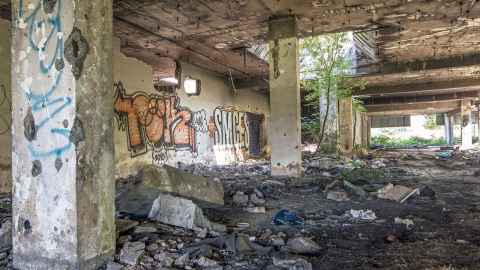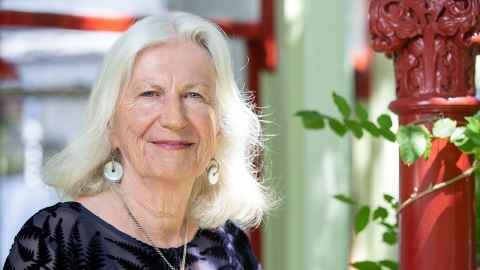How to split a society
17 January 2024
Opinion: In our small, intimate society, we would be wise to hold fast to mutual goodwill, recognise genuine grievances and address them rather than let ourselves become dangerously divided, writes Anne Salmond.

Thirty years ago, in 1993, I attended a conference at Oxford which included a workshop on what was happening in Bosnia, where war had just broken out.
Young anthropologists who had been conducting their field work in that country described how a society in which many Serbs and Croats thought they had solved their historical differences was deliberately split apart.
It began with small acts of violence that rapidly escalated. In mixed communities, where families had intermarried and strong friendships had been forged, soldiers from one ethnic group forced men from the other at gunpoint to rape their neighbours’ wives, in places where their children had played together.
Villages were destroyed, their inhabitants killed or transported to concentration camps, survivors were tortured and mass rapes carried out. The anthropologists who witnessed this process were shocked by its improbability and the speed with which it accelerated.
I vividly recall one young anthropologist telling us, “This could happen anywhere”. Given the wrong kind of leadership, they said, no society is immune from this kind of destruction. Peaceful relationships among different social groups should never be taken for granted.
It began with small acts of violence that rapidly escalated.
I have never forgotten that workshop, and its message remains pertinent. In the contemporary world, democracies that were once robust and resilient are splintering and falling apart.
Societies that once had a strong sense of collective identity are being split into mutually hostile camps, based on a ‘them vs us’ mentality that denies any sense of common purpose.
In a process described by scholars as ‘pernicious polarisation,’ self-interested elites generate Us and Them perceptions by deliberately activating, exploiting or distorting latent social cleavages.
Identities – political, ethnic or religious – may be reduced to simple binaries: Republican vs Democrat, left vs right, black vs white, Iwi vs Kiwi, Catholic vs Protestant, Serb vs Croat.
According to comparative analyses of this kind of ploy, “identity can become all-encompassing as people view those in the ‘other’ camp with distrust, suspicion, or fear, and cease to interact with them – even segregating themselves in their neighbourhoods, social relationships, and news-feeds with like-minded people”.

The middle ground becomes a battle ground (sometimes literally); moderate voices are silenced, and those with cross-cutting loyalties are cancelled. In the process, absolute power may be sought, by authoritarian leaders, for example.
The comparative studies are very clear about the dangers. If left unchecked, this kind of escalating division can devastate nation states, wreck their economies and destroy the lives of their people.
This has happened in countries of all kinds – Serbs and Croats in Bosnia; Catholics and Protestants in Ireland; Israelis and Palestinians in Gaza; Hutu and Tutsi in Rwanda, and in many other African nations, for example. Many analyses are being written about ‘pernicious polarisation’ in America at present.
Accounts of pernicious polarisation describe how political elites deliberately fuel divisions to enhance their own power:
“Polarising speech articulates or even suggests a grievance, stoking fears, anxieties and resentments that then become expressed as hostility, bias and eventually enmity. By choosing the cleavage or grievance to highlight, political elites drive the polarisation.”
They note how this impacts politics, the civil service, the media and the economy:
“Structural changes also tend to happen in the economy, bureaucracy and key sectors such as the media that enable or reinforce the weakening of the middle ground in public and political discourse. Accordingly, ownership and/or management of institutions shift to opportunistic or ideological loyalists of one bloc or the other. This results in a situation where, for example, independent journalists find it increasingly more difficult to shape the news, or, worse, maintain their jobs.”
If left unchecked, this kind of escalating division can devastate nation states, wreck their economies and destroy the lives of their people.
The grievances may be genuine, in radically unequal societies, for instance, or those with unresponsive, technocratic governments, or where ethnic, social or religious groups are stigmatised and unjustly treated.
This escalating dynamic, however, destroys goodwill in ways that are likely to prove devastating for all parties – from vilification and personal violence to terrorist attacks to civil war, as in Bosnia.
As for political parties involved in such processes, according to the comparative studies: “Incumbent polarising parties typically attempt to govern on their own and eschew norms for bipartisan or multi-partisan decision-making.”
That may include governing with an absolute majority without consulting the opposition or the wider electorate; forging alliances with smaller, more extreme parties; or governing by autocracy, repression and violence.
No country is immune from this kind of politics. After the 2020 election in New Zealand, for instance, when Labour won an absolute majority, the government engaged in unilateral decision-making that accentuated existing social cleavages – central vs local government, rural vs urban communities and Māori vs other New Zealanders, for instance.
In their turn, other political agents played upon these divisions. One can see this in the virulent social media and other attacks upon a once popular prime minister, Jacinda Ardern, fuelled by male-female and urban-rural polarities (in elements of the Groundswell campaign, for instance), or ‘Iwi vs Kiwi’ polarities in relation to Te Tiriti.
While in the past, genuine grievances have been addressed with bipartisan support through the Waitangi Tribunal, equal opportunities programmes or the creation of ministries to address the needs of women, Pacific Islanders and Māori, some politicians now depict these as forms of privilege, stoking popular resentment.
No country is immune from this kind of politics.
Any reader of the literature will recognise these as well-rehearsed strategies from the pernicious polarisation playbook.
In forming the new Government, the National Party forged alliances with smaller, more extreme parties intent on amplifying their power, entering dangerous territory.
With its immoderate attacks on the media, te reo, women and the environment, New Zealand First plays upon ethnic, gender and rural-urban polarities to increase its influence far beyond its six percent share of the vote.
National’s other partner, Act, with its wealthy funders and well-documented links through the Taxpayers’ Union and the New Zealand Initiative with the Atlas global network of far-right think tanks, attacks equal opportunities programmes, ministries for women, Pacific peoples and Māori, and seeks a referendum on Te Tiriti.
There is no thought of asking these groups, far more than half of the population, what they think of its proposals. At the same time Act is targeting key structures in the civil service and the education system to implement its right-wing philosophies, far in excess of its 8.6 percent mandate.
Although the authors of comparative studies of pernicious polarisation offer no silver bullet for combating its threats to democratic checks and balances, they warn that responding in kind with vilification and reprisals only speeds up the process.
Rather, they suggest casting light on such stratagems and those who deploy them, and the deliberate strengthening of the middle ground through bi-partisan policymaking, advisory groups that are representative, not packed with members of one’s own political tribe, wide civic engagement and well-moderated, inclusive conversations about divisive matters, in citizens’ assemblies, for example.
Most New Zealanders want to live in a peaceful, prosperous and inclusive country. No society is immune to these divisive strategies, however, especially when backed by large-scale funding, designed by artificial intelligence and delivered by social media.
As a small and relatively isolated nation, New Zealand is vulnerable to this kind of manipulation, and the violence it can engender. We saw this in the recent occupation of Parliament grounds.
Perhaps naively, I think most Kiwi politicians want to serve their fellow citizens. Socially responsible strategists in all political parties must stay alert to deliberate polarisation, realise that it can become uncontrollable and do their best to avoid it. At the beginning of a new political year, this places a huge responsibility on the shoulders of our new Prime Minister, Christopher Luxon, and his advisers.
Like arsonists who light fires that destroy entire communities, self-interested elites who stoke “fears, anxieties and resentments that then become expressed as hostility, bias and eventually enmity” can do the same.
The media need to conduct independent investigations into this kind of politics in New Zealand, and who is funding and guiding their activities.
Ordinary citizens also need to be astute and recognise when they are being played by self-interested political agents, whether domestic or international.
In our small, intimate society, we would be wise to hold fast to mutual goodwill and a sense of decency, recognise genuine grievances and do our utmost to address them, and look for the best in each other.
As I learned in 1993, when countries fly apart, there are no safe places to hide.
Anne Salmond is a Distinguished Professor of Māori Studies and Anthropology at Waipapa Taumata Rau, University of Auckland. Dame Anne was the 2013 New Zealander of the Year and awarded the Order of New Zealand in 2020.
This article reflects the opinion of the author and not necessarily the views of Waipapa Taumata Rau, University of Auckland.
It was first published as How to Split a Society in Newsroom on 13 January 2024.
Media contact
Julianne Evans | Media adviser
M: 027 562 5868
E: julianne.evans@auckland.ac.nz